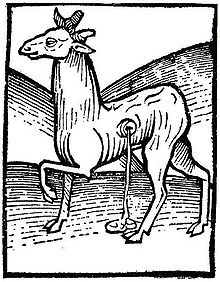- Deer musk
-
Deer musk is a substance with a persistent odor obtained from a gland of the male musk deer situated between its back/rectal area. The substance has been extensively used as a perfume fixative, incense material, and medicine, since ancient times. It was, and is still one of the most expensive animal products in the world. The name, originated from Sanskrit muṣká meaning "testicle".
Although more commonly referred to as "musk", the term itself is often used to describe a wide variety of "musky" substances from other animals such as the African Civet ("Civet musk") or various synthetic musks whose compound exhibits some character of deer musk.
Contents
Cultural history
The etymology of the name musk, originating from Indian Sanskrit मुस्कस् muṣká via Middle Persian مسک mušk, Late Greek μόσχος (moschos), Late Latin muscus, Middle French musc and Middle English muske,[1][2] hints at its trade route.
In Ayurveda, the ancient Indian medicinal system, musk has been used in various cardiac, mental and neurological disorders for centuries. It has also been included in various compound formulations.
Deer musk was unknown in classical antiquity and reference to it does not appear until the 5th century when it is mentioned in the Talmud (Brachot 43.) as an animal-based fragrance. The 6th-century Greek explorer Cosmas Indicopleustes mentioned it as a product obtained from India.[3] Soon afterwards Arab and Byzantine perfume makers began to use it, and it acquired a reputation as an aphrodisiac.[3] Under the Abbasid Empire of Arabs it was highly regarded, and the caliphs of Baghdad used it lavishly. In the early 9th century, Al-Kindi included it in a large number of his perfume recipes and it became one of the important luxury items brought by Arabian ships from the East.[3] Deer musk has been a key constituent in many perfumes since its discovery, being held to give a perfume long-lasting power as a fixative. Despite its high price, musk tinctures were used in perfumery until 1979, when musk deers were protected as an endangered species by the Convention on the International Trade in Endangered Species of Wild Flora and Fauna (CITES). Today the trade quantity of the natural musk is controlled by CITES but illegal poaching and trading continues.[4] An illegal shipment of 700 kilograms (1,500 lb) of Chinese musk from the musk deer was seized in Japan in 1987, an amount corresponding to approximately 100,000 deer killed.[5]
Harvesting
The musk deer belongs to the family Moschidae and lives in India, Pakistan, China, Siberia and Mongolia. To obtain their musk, the deer is killed and its gland, also called "musk pod", is removed. It is dried either in the sun, on a hot stone, or by immersion in hot oil. Upon drying, the reddish-brown paste turns into a black granular material called "musk grain", which is used for alcoholic solutions. The aroma of the tincture becomes more intense during storage and gives a pleasant odor only after it is considerably diluted. No other natural substance has such a complex aroma associated with so many contradictory descriptions; however, it is usually described abstractly as animalic, earthy and woody[6] or something akin to the odor of baby's skin.[4]
Physical qualities
Good deer musk is of a dark purplish color, dry, smooth and unctuous to the touch, and bitter in taste. The grain of musk will distinctly scent millions of cubic feet of air without any appreciable loss of weight, and its scent is not only more penetrating but more persistent than that of any other known substance. In addition to its odoriferous principle, it contains ammonia, cholesterol, fatty matter, a bitter resinous substance, and other animal principles.
The best quality is Tonkin musk from China, followed by Assam and Nepal musk, while Carbadine musk from Russian and Chinese Himalayan regions are considered inferior.[4] Obtaining one kilogram (2.2 lb) of musk grains requires between thirty and fifty deer, making musk tinctures highly expensive. At the beginning of the 19th century, Tonkin musk grains cost about twice their weight in gold.[4]
References
- ^ "Merriam-Webster's Online Dictionary: musk". Merriam-Webster. http://www.m-w.com/dictionary/musk. Retrieved 2007-04-07.
- ^ Chantraine, Pierre (1990). Dictionnaire étymologique de la langue grecque. Klincksieck. pp. 715. ISBN 2-252-03277-4.
- ^ a b c Groom, Nigel (1997). New Perfume Handbook. Springer. pp. 219–220. ISBN 0751404039.
- ^ a b c d Rowe, David J. (Ed.); Philip Kraft (2004). "Chapter 7. Aroma Chemicals IV: Musks". Chemistry and Technology of Flavours and Fragrances. Blackwell. ISBN 084932372X.
- ^ Edmonds, Richard Louis (Ed.); James Harkness (2000). "Recent Trends in Forestry and Conservation of Biodiversity in China". Managing the Chinese Environment (Studies on Contemporary China). Oxford University Press. pp. 191. ISBN 0198296355.
- ^ Rimkus, Gerhard G. (Ed.); Cornelia Sommer (2004). "The Role of Musk and Musk Compounds in the Fragrance Industry". Synthetic Musk Fragrances in the Environment (Handbook of Environmental Chemistry). Springer. ISBN 3540437061.
See also
External links
Categories:- Animal glandular products
- Perfume ingredients
Wikimedia Foundation. 2010.

